Reflective Practices Report: Healthcare Professional, Semester 2, 2019
VerifiedAdded on 2023/01/11
|7
|2964
|89
Report
AI Summary
This report delves into the application of reflective practices within a healthcare context, focusing on the author's experiences in a multidisciplinary team. It explores the use of Kolb's learning cycle and the Gibbs reflective cycle to analyze past events and identify areas for improvement. The report highlights challenges related to team formation, communication, and unequal task distribution. It also examines the theoretical framework of the Ethics of Care and discusses the implementation of SMART goals for professional development. The author reflects on the importance of effective leadership, strong communication, and equal task distribution for successful teamwork. The report concludes with a personal evaluation of the author's performance and outlines strategies for future group presentations and improved collaboration within the healthcare setting. The report emphasizes the importance of learning from past experiences to enhance future professional growth and skills.
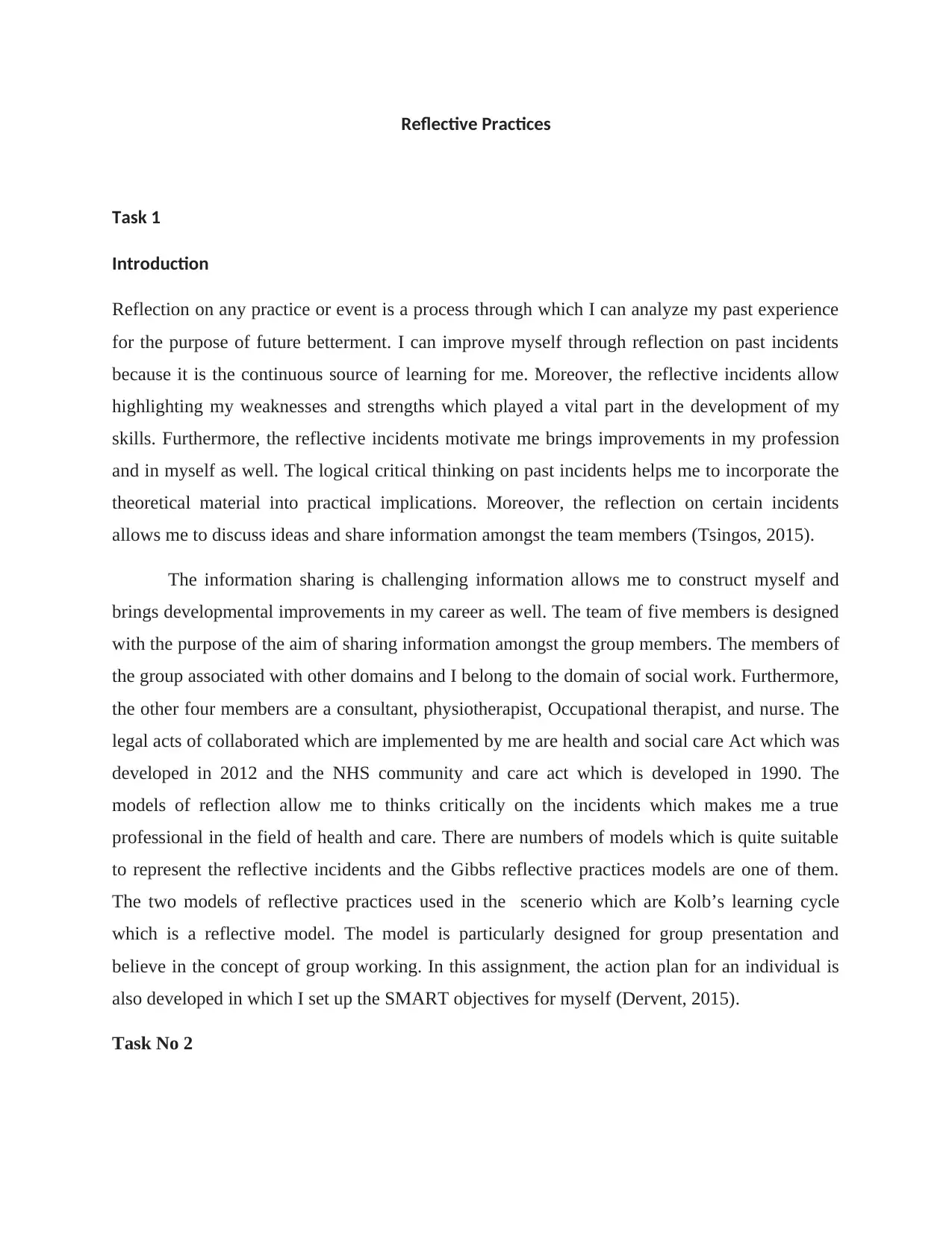
Reflective Practices
Task 1
Introduction
Reflection on any practice or event is a process through which I can analyze my past experience
for the purpose of future betterment. I can improve myself through reflection on past incidents
because it is the continuous source of learning for me. Moreover, the reflective incidents allow
highlighting my weaknesses and strengths which played a vital part in the development of my
skills. Furthermore, the reflective incidents motivate me brings improvements in my profession
and in myself as well. The logical critical thinking on past incidents helps me to incorporate the
theoretical material into practical implications. Moreover, the reflection on certain incidents
allows me to discuss ideas and share information amongst the team members (Tsingos, 2015).
The information sharing is challenging information allows me to construct myself and
brings developmental improvements in my career as well. The team of five members is designed
with the purpose of the aim of sharing information amongst the group members. The members of
the group associated with other domains and I belong to the domain of social work. Furthermore,
the other four members are a consultant, physiotherapist, Occupational therapist, and nurse. The
legal acts of collaborated which are implemented by me are health and social care Act which was
developed in 2012 and the NHS community and care act which is developed in 1990. The
models of reflection allow me to thinks critically on the incidents which makes me a true
professional in the field of health and care. There are numbers of models which is quite suitable
to represent the reflective incidents and the Gibbs reflective practices models are one of them.
The two models of reflective practices used in the scenerio which are Kolb’s learning cycle
which is a reflective model. The model is particularly designed for group presentation and
believe in the concept of group working. In this assignment, the action plan for an individual is
also developed in which I set up the SMART objectives for myself (Dervent, 2015).
Task No 2
Task 1
Introduction
Reflection on any practice or event is a process through which I can analyze my past experience
for the purpose of future betterment. I can improve myself through reflection on past incidents
because it is the continuous source of learning for me. Moreover, the reflective incidents allow
highlighting my weaknesses and strengths which played a vital part in the development of my
skills. Furthermore, the reflective incidents motivate me brings improvements in my profession
and in myself as well. The logical critical thinking on past incidents helps me to incorporate the
theoretical material into practical implications. Moreover, the reflection on certain incidents
allows me to discuss ideas and share information amongst the team members (Tsingos, 2015).
The information sharing is challenging information allows me to construct myself and
brings developmental improvements in my career as well. The team of five members is designed
with the purpose of the aim of sharing information amongst the group members. The members of
the group associated with other domains and I belong to the domain of social work. Furthermore,
the other four members are a consultant, physiotherapist, Occupational therapist, and nurse. The
legal acts of collaborated which are implemented by me are health and social care Act which was
developed in 2012 and the NHS community and care act which is developed in 1990. The
models of reflection allow me to thinks critically on the incidents which makes me a true
professional in the field of health and care. There are numbers of models which is quite suitable
to represent the reflective incidents and the Gibbs reflective practices models are one of them.
The two models of reflective practices used in the scenerio which are Kolb’s learning cycle
which is a reflective model. The model is particularly designed for group presentation and
believe in the concept of group working. In this assignment, the action plan for an individual is
also developed in which I set up the SMART objectives for myself (Dervent, 2015).
Task No 2
Paraphrase This Document
Need a fresh take? Get an instant paraphrase of this document with our AI Paraphraser
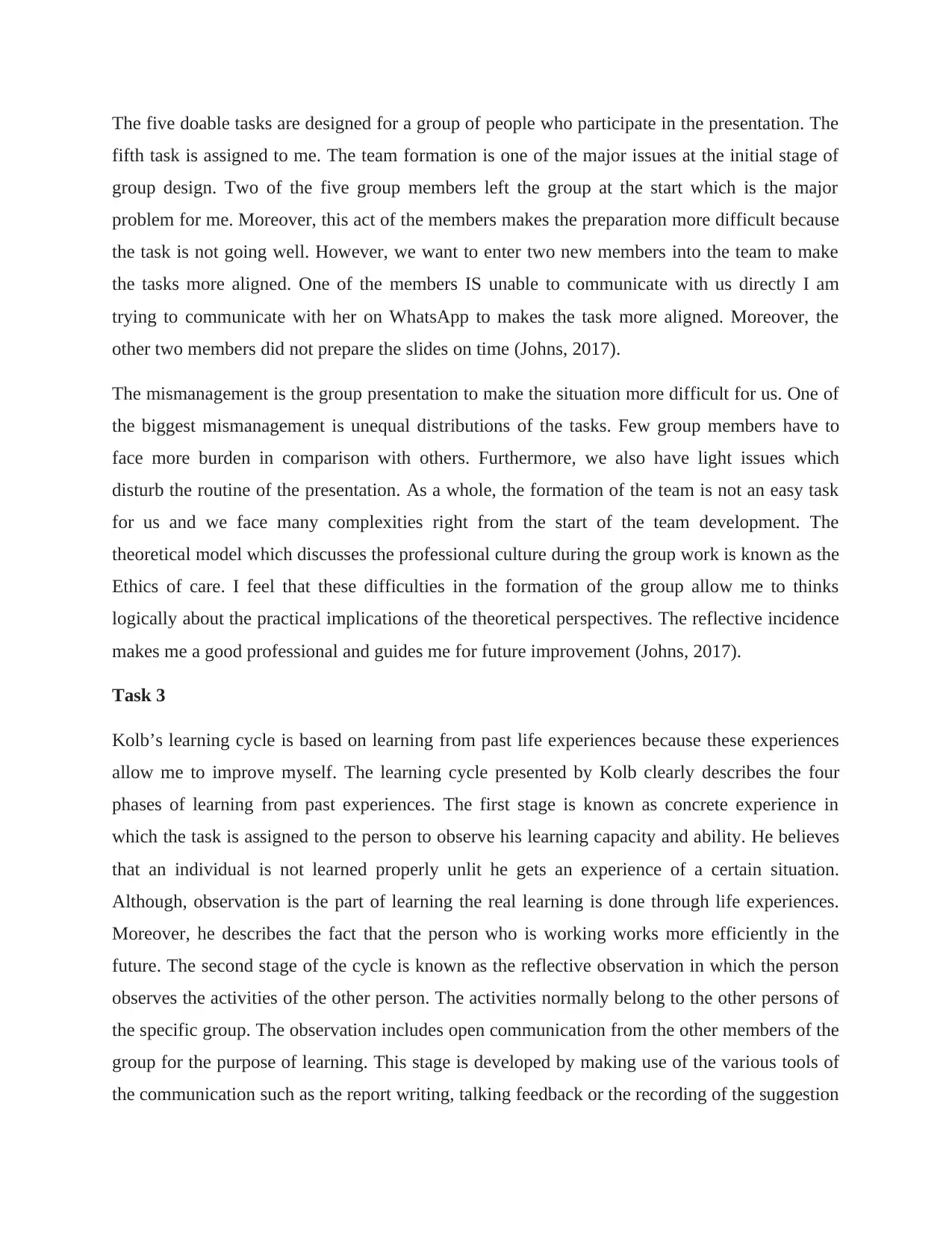
The five doable tasks are designed for a group of people who participate in the presentation. The
fifth task is assigned to me. The team formation is one of the major issues at the initial stage of
group design. Two of the five group members left the group at the start which is the major
problem for me. Moreover, this act of the members makes the preparation more difficult because
the task is not going well. However, we want to enter two new members into the team to make
the tasks more aligned. One of the members IS unable to communicate with us directly I am
trying to communicate with her on WhatsApp to makes the task more aligned. Moreover, the
other two members did not prepare the slides on time (Johns, 2017).
The mismanagement is the group presentation to make the situation more difficult for us. One of
the biggest mismanagement is unequal distributions of the tasks. Few group members have to
face more burden in comparison with others. Furthermore, we also have light issues which
disturb the routine of the presentation. As a whole, the formation of the team is not an easy task
for us and we face many complexities right from the start of the team development. The
theoretical model which discusses the professional culture during the group work is known as the
Ethics of care. I feel that these difficulties in the formation of the group allow me to thinks
logically about the practical implications of the theoretical perspectives. The reflective incidence
makes me a good professional and guides me for future improvement (Johns, 2017).
Task 3
Kolb’s learning cycle is based on learning from past life experiences because these experiences
allow me to improve myself. The learning cycle presented by Kolb clearly describes the four
phases of learning from past experiences. The first stage is known as concrete experience in
which the task is assigned to the person to observe his learning capacity and ability. He believes
that an individual is not learned properly unlit he gets an experience of a certain situation.
Although, observation is the part of learning the real learning is done through life experiences.
Moreover, he describes the fact that the person who is working works more efficiently in the
future. The second stage of the cycle is known as the reflective observation in which the person
observes the activities of the other person. The activities normally belong to the other persons of
the specific group. The observation includes open communication from the other members of the
group for the purpose of learning. This stage is developed by making use of the various tools of
the communication such as the report writing, talking feedback or the recording of the suggestion
fifth task is assigned to me. The team formation is one of the major issues at the initial stage of
group design. Two of the five group members left the group at the start which is the major
problem for me. Moreover, this act of the members makes the preparation more difficult because
the task is not going well. However, we want to enter two new members into the team to make
the tasks more aligned. One of the members IS unable to communicate with us directly I am
trying to communicate with her on WhatsApp to makes the task more aligned. Moreover, the
other two members did not prepare the slides on time (Johns, 2017).
The mismanagement is the group presentation to make the situation more difficult for us. One of
the biggest mismanagement is unequal distributions of the tasks. Few group members have to
face more burden in comparison with others. Furthermore, we also have light issues which
disturb the routine of the presentation. As a whole, the formation of the team is not an easy task
for us and we face many complexities right from the start of the team development. The
theoretical model which discusses the professional culture during the group work is known as the
Ethics of care. I feel that these difficulties in the formation of the group allow me to thinks
logically about the practical implications of the theoretical perspectives. The reflective incidence
makes me a good professional and guides me for future improvement (Johns, 2017).
Task 3
Kolb’s learning cycle is based on learning from past life experiences because these experiences
allow me to improve myself. The learning cycle presented by Kolb clearly describes the four
phases of learning from past experiences. The first stage is known as concrete experience in
which the task is assigned to the person to observe his learning capacity and ability. He believes
that an individual is not learned properly unlit he gets an experience of a certain situation.
Although, observation is the part of learning the real learning is done through life experiences.
Moreover, he describes the fact that the person who is working works more efficiently in the
future. The second stage of the cycle is known as the reflective observation in which the person
observes the activities of the other person. The activities normally belong to the other persons of
the specific group. The observation includes open communication from the other members of the
group for the purpose of learning. This stage is developed by making use of the various tools of
the communication such as the report writing, talking feedback or the recording of the suggestion
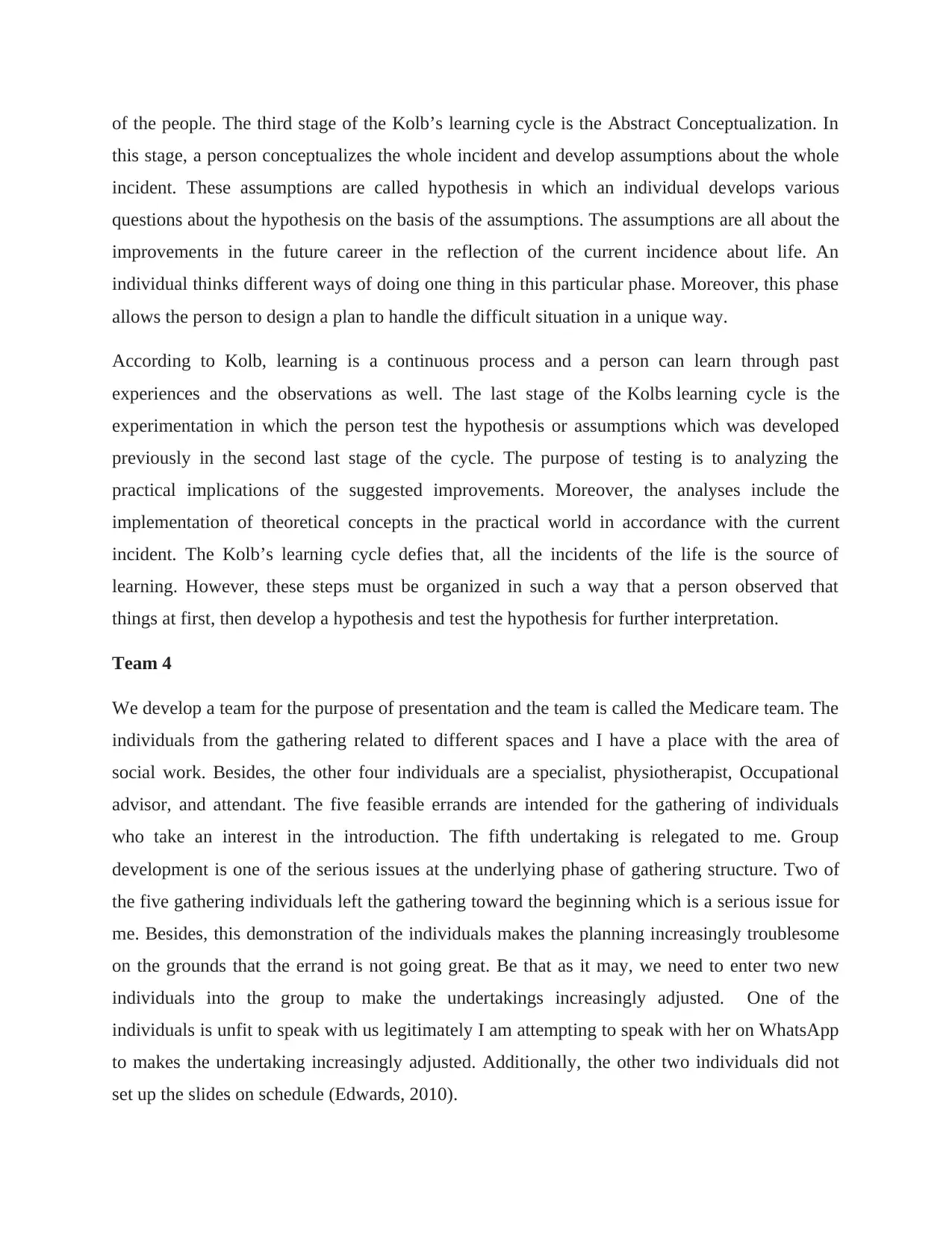
of the people. The third stage of the Kolb’s learning cycle is the Abstract Conceptualization. In
this stage, a person conceptualizes the whole incident and develop assumptions about the whole
incident. These assumptions are called hypothesis in which an individual develops various
questions about the hypothesis on the basis of the assumptions. The assumptions are all about the
improvements in the future career in the reflection of the current incidence about life. An
individual thinks different ways of doing one thing in this particular phase. Moreover, this phase
allows the person to design a plan to handle the difficult situation in a unique way.
According to Kolb, learning is a continuous process and a person can learn through past
experiences and the observations as well. The last stage of the Kolbs learning cycle is the
experimentation in which the person test the hypothesis or assumptions which was developed
previously in the second last stage of the cycle. The purpose of testing is to analyzing the
practical implications of the suggested improvements. Moreover, the analyses include the
implementation of theoretical concepts in the practical world in accordance with the current
incident. The Kolb’s learning cycle defies that, all the incidents of the life is the source of
learning. However, these steps must be organized in such a way that a person observed that
things at first, then develop a hypothesis and test the hypothesis for further interpretation.
Team 4
We develop a team for the purpose of presentation and the team is called the Medicare team. The
individuals from the gathering related to different spaces and I have a place with the area of
social work. Besides, the other four individuals are a specialist, physiotherapist, Occupational
advisor, and attendant. The five feasible errands are intended for the gathering of individuals
who take an interest in the introduction. The fifth undertaking is relegated to me. Group
development is one of the serious issues at the underlying phase of gathering structure. Two of
the five gathering individuals left the gathering toward the beginning which is a serious issue for
me. Besides, this demonstration of the individuals makes the planning increasingly troublesome
on the grounds that the errand is not going great. Be that as it may, we need to enter two new
individuals into the group to make the undertakings increasingly adjusted. One of the
individuals is unfit to speak with us legitimately I am attempting to speak with her on WhatsApp
to makes the undertaking increasingly adjusted. Additionally, the other two individuals did not
set up the slides on schedule (Edwards, 2010).
this stage, a person conceptualizes the whole incident and develop assumptions about the whole
incident. These assumptions are called hypothesis in which an individual develops various
questions about the hypothesis on the basis of the assumptions. The assumptions are all about the
improvements in the future career in the reflection of the current incidence about life. An
individual thinks different ways of doing one thing in this particular phase. Moreover, this phase
allows the person to design a plan to handle the difficult situation in a unique way.
According to Kolb, learning is a continuous process and a person can learn through past
experiences and the observations as well. The last stage of the Kolbs learning cycle is the
experimentation in which the person test the hypothesis or assumptions which was developed
previously in the second last stage of the cycle. The purpose of testing is to analyzing the
practical implications of the suggested improvements. Moreover, the analyses include the
implementation of theoretical concepts in the practical world in accordance with the current
incident. The Kolb’s learning cycle defies that, all the incidents of the life is the source of
learning. However, these steps must be organized in such a way that a person observed that
things at first, then develop a hypothesis and test the hypothesis for further interpretation.
Team 4
We develop a team for the purpose of presentation and the team is called the Medicare team. The
individuals from the gathering related to different spaces and I have a place with the area of
social work. Besides, the other four individuals are a specialist, physiotherapist, Occupational
advisor, and attendant. The five feasible errands are intended for the gathering of individuals
who take an interest in the introduction. The fifth undertaking is relegated to me. Group
development is one of the serious issues at the underlying phase of gathering structure. Two of
the five gathering individuals left the gathering toward the beginning which is a serious issue for
me. Besides, this demonstration of the individuals makes the planning increasingly troublesome
on the grounds that the errand is not going great. Be that as it may, we need to enter two new
individuals into the group to make the undertakings increasingly adjusted. One of the
individuals is unfit to speak with us legitimately I am attempting to speak with her on WhatsApp
to makes the undertaking increasingly adjusted. Additionally, the other two individuals did not
set up the slides on schedule (Edwards, 2010).
⊘ This is a preview!⊘
Do you want full access?
Subscribe today to unlock all pages.

Trusted by 1+ million students worldwide
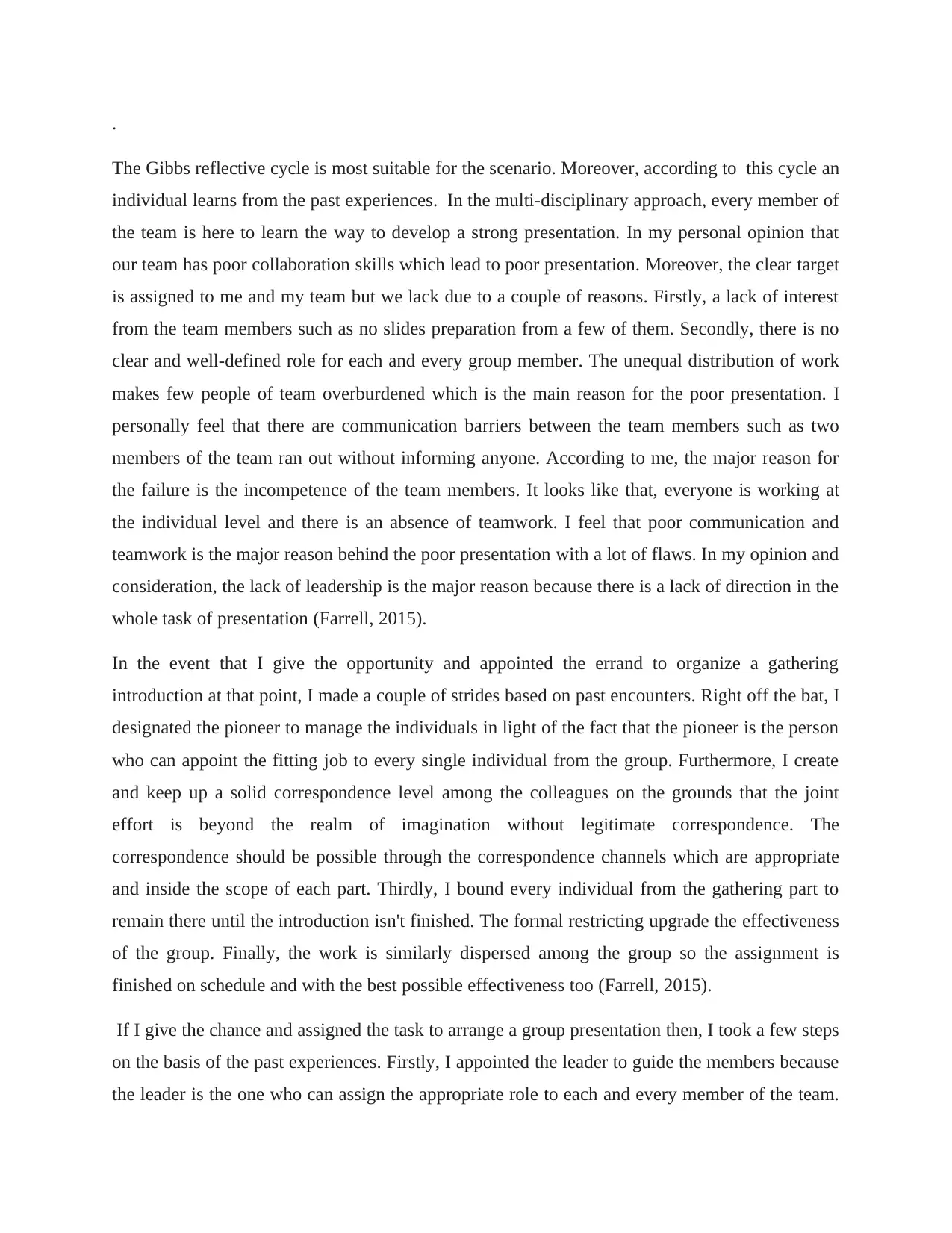
.
The Gibbs reflective cycle is most suitable for the scenario. Moreover, according to this cycle an
individual learns from the past experiences. In the multi-disciplinary approach, every member of
the team is here to learn the way to develop a strong presentation. In my personal opinion that
our team has poor collaboration skills which lead to poor presentation. Moreover, the clear target
is assigned to me and my team but we lack due to a couple of reasons. Firstly, a lack of interest
from the team members such as no slides preparation from a few of them. Secondly, there is no
clear and well-defined role for each and every group member. The unequal distribution of work
makes few people of team overburdened which is the main reason for the poor presentation. I
personally feel that there are communication barriers between the team members such as two
members of the team ran out without informing anyone. According to me, the major reason for
the failure is the incompetence of the team members. It looks like that, everyone is working at
the individual level and there is an absence of teamwork. I feel that poor communication and
teamwork is the major reason behind the poor presentation with a lot of flaws. In my opinion and
consideration, the lack of leadership is the major reason because there is a lack of direction in the
whole task of presentation (Farrell, 2015).
In the event that I give the opportunity and appointed the errand to organize a gathering
introduction at that point, I made a couple of strides based on past encounters. Right off the bat, I
designated the pioneer to manage the individuals in light of the fact that the pioneer is the person
who can appoint the fitting job to every single individual from the group. Furthermore, I create
and keep up a solid correspondence level among the colleagues on the grounds that the joint
effort is beyond the realm of imagination without legitimate correspondence. The
correspondence should be possible through the correspondence channels which are appropriate
and inside the scope of each part. Thirdly, I bound every individual from the gathering part to
remain there until the introduction isn't finished. The formal restricting upgrade the effectiveness
of the group. Finally, the work is similarly dispersed among the group so the assignment is
finished on schedule and with the best possible effectiveness too (Farrell, 2015).
If I give the chance and assigned the task to arrange a group presentation then, I took a few steps
on the basis of the past experiences. Firstly, I appointed the leader to guide the members because
the leader is the one who can assign the appropriate role to each and every member of the team.
The Gibbs reflective cycle is most suitable for the scenario. Moreover, according to this cycle an
individual learns from the past experiences. In the multi-disciplinary approach, every member of
the team is here to learn the way to develop a strong presentation. In my personal opinion that
our team has poor collaboration skills which lead to poor presentation. Moreover, the clear target
is assigned to me and my team but we lack due to a couple of reasons. Firstly, a lack of interest
from the team members such as no slides preparation from a few of them. Secondly, there is no
clear and well-defined role for each and every group member. The unequal distribution of work
makes few people of team overburdened which is the main reason for the poor presentation. I
personally feel that there are communication barriers between the team members such as two
members of the team ran out without informing anyone. According to me, the major reason for
the failure is the incompetence of the team members. It looks like that, everyone is working at
the individual level and there is an absence of teamwork. I feel that poor communication and
teamwork is the major reason behind the poor presentation with a lot of flaws. In my opinion and
consideration, the lack of leadership is the major reason because there is a lack of direction in the
whole task of presentation (Farrell, 2015).
In the event that I give the opportunity and appointed the errand to organize a gathering
introduction at that point, I made a couple of strides based on past encounters. Right off the bat, I
designated the pioneer to manage the individuals in light of the fact that the pioneer is the person
who can appoint the fitting job to every single individual from the group. Furthermore, I create
and keep up a solid correspondence level among the colleagues on the grounds that the joint
effort is beyond the realm of imagination without legitimate correspondence. The
correspondence should be possible through the correspondence channels which are appropriate
and inside the scope of each part. Thirdly, I bound every individual from the gathering part to
remain there until the introduction isn't finished. The formal restricting upgrade the effectiveness
of the group. Finally, the work is similarly dispersed among the group so the assignment is
finished on schedule and with the best possible effectiveness too (Farrell, 2015).
If I give the chance and assigned the task to arrange a group presentation then, I took a few steps
on the basis of the past experiences. Firstly, I appointed the leader to guide the members because
the leader is the one who can assign the appropriate role to each and every member of the team.
Paraphrase This Document
Need a fresh take? Get an instant paraphrase of this document with our AI Paraphraser
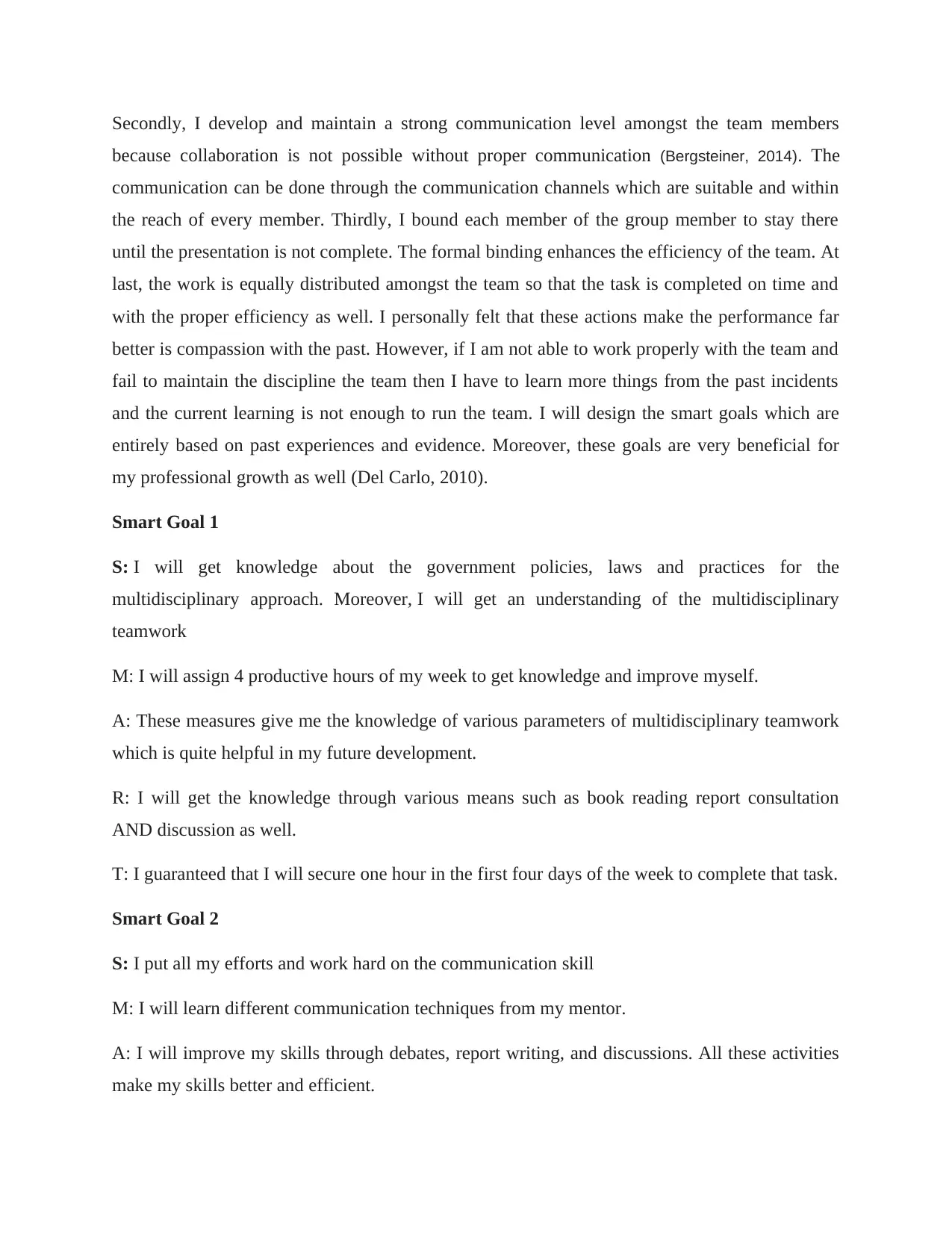
Secondly, I develop and maintain a strong communication level amongst the team members
because collaboration is not possible without proper communication (Bergsteiner, 2014). The
communication can be done through the communication channels which are suitable and within
the reach of every member. Thirdly, I bound each member of the group member to stay there
until the presentation is not complete. The formal binding enhances the efficiency of the team. At
last, the work is equally distributed amongst the team so that the task is completed on time and
with the proper efficiency as well. I personally felt that these actions make the performance far
better is compassion with the past. However, if I am not able to work properly with the team and
fail to maintain the discipline the team then I have to learn more things from the past incidents
and the current learning is not enough to run the team. I will design the smart goals which are
entirely based on past experiences and evidence. Moreover, these goals are very beneficial for
my professional growth as well (Del Carlo, 2010).
Smart Goal 1
S: I will get knowledge about the government policies, laws and practices for the
multidisciplinary approach. Moreover, I will get an understanding of the multidisciplinary
teamwork
M: I will assign 4 productive hours of my week to get knowledge and improve myself.
A: These measures give me the knowledge of various parameters of multidisciplinary teamwork
which is quite helpful in my future development.
R: I will get the knowledge through various means such as book reading report consultation
AND discussion as well.
T: I guaranteed that I will secure one hour in the first four days of the week to complete that task.
Smart Goal 2
S: I put all my efforts and work hard on the communication skill
M: I will learn different communication techniques from my mentor.
A: I will improve my skills through debates, report writing, and discussions. All these activities
make my skills better and efficient.
because collaboration is not possible without proper communication (Bergsteiner, 2014). The
communication can be done through the communication channels which are suitable and within
the reach of every member. Thirdly, I bound each member of the group member to stay there
until the presentation is not complete. The formal binding enhances the efficiency of the team. At
last, the work is equally distributed amongst the team so that the task is completed on time and
with the proper efficiency as well. I personally felt that these actions make the performance far
better is compassion with the past. However, if I am not able to work properly with the team and
fail to maintain the discipline the team then I have to learn more things from the past incidents
and the current learning is not enough to run the team. I will design the smart goals which are
entirely based on past experiences and evidence. Moreover, these goals are very beneficial for
my professional growth as well (Del Carlo, 2010).
Smart Goal 1
S: I will get knowledge about the government policies, laws and practices for the
multidisciplinary approach. Moreover, I will get an understanding of the multidisciplinary
teamwork
M: I will assign 4 productive hours of my week to get knowledge and improve myself.
A: These measures give me the knowledge of various parameters of multidisciplinary teamwork
which is quite helpful in my future development.
R: I will get the knowledge through various means such as book reading report consultation
AND discussion as well.
T: I guaranteed that I will secure one hour in the first four days of the week to complete that task.
Smart Goal 2
S: I put all my efforts and work hard on the communication skill
M: I will learn different communication techniques from my mentor.
A: I will improve my skills through debates, report writing, and discussions. All these activities
make my skills better and efficient.
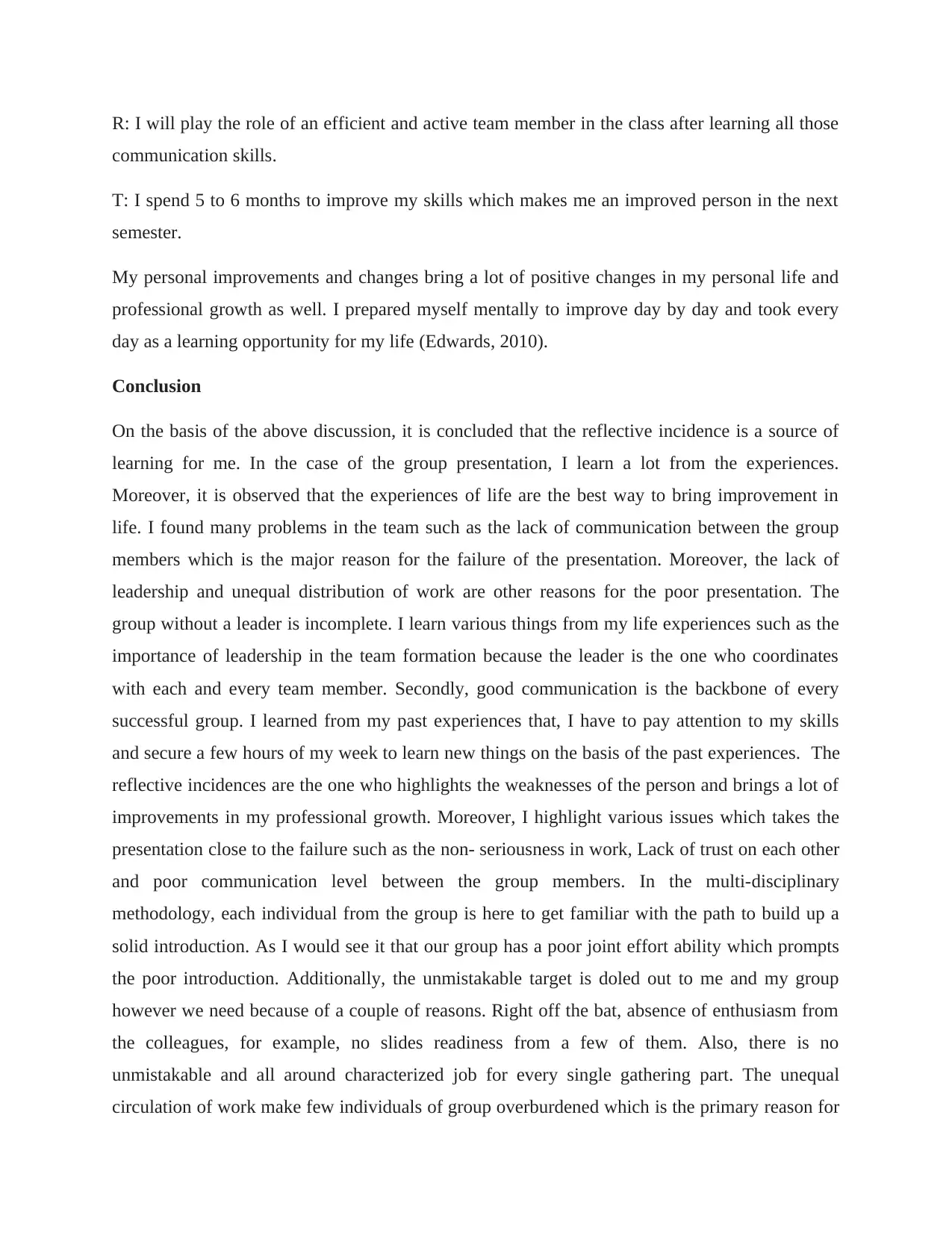
R: I will play the role of an efficient and active team member in the class after learning all those
communication skills.
T: I spend 5 to 6 months to improve my skills which makes me an improved person in the next
semester.
My personal improvements and changes bring a lot of positive changes in my personal life and
professional growth as well. I prepared myself mentally to improve day by day and took every
day as a learning opportunity for my life (Edwards, 2010).
Conclusion
On the basis of the above discussion, it is concluded that the reflective incidence is a source of
learning for me. In the case of the group presentation, I learn a lot from the experiences.
Moreover, it is observed that the experiences of life are the best way to bring improvement in
life. I found many problems in the team such as the lack of communication between the group
members which is the major reason for the failure of the presentation. Moreover, the lack of
leadership and unequal distribution of work are other reasons for the poor presentation. The
group without a leader is incomplete. I learn various things from my life experiences such as the
importance of leadership in the team formation because the leader is the one who coordinates
with each and every team member. Secondly, good communication is the backbone of every
successful group. I learned from my past experiences that, I have to pay attention to my skills
and secure a few hours of my week to learn new things on the basis of the past experiences. The
reflective incidences are the one who highlights the weaknesses of the person and brings a lot of
improvements in my professional growth. Moreover, I highlight various issues which takes the
presentation close to the failure such as the non- seriousness in work, Lack of trust on each other
and poor communication level between the group members. In the multi-disciplinary
methodology, each individual from the group is here to get familiar with the path to build up a
solid introduction. As I would see it that our group has a poor joint effort ability which prompts
the poor introduction. Additionally, the unmistakable target is doled out to me and my group
however we need because of a couple of reasons. Right off the bat, absence of enthusiasm from
the colleagues, for example, no slides readiness from a few of them. Also, there is no
unmistakable and all around characterized job for every single gathering part. The unequal
circulation of work make few individuals of group overburdened which is the primary reason for
communication skills.
T: I spend 5 to 6 months to improve my skills which makes me an improved person in the next
semester.
My personal improvements and changes bring a lot of positive changes in my personal life and
professional growth as well. I prepared myself mentally to improve day by day and took every
day as a learning opportunity for my life (Edwards, 2010).
Conclusion
On the basis of the above discussion, it is concluded that the reflective incidence is a source of
learning for me. In the case of the group presentation, I learn a lot from the experiences.
Moreover, it is observed that the experiences of life are the best way to bring improvement in
life. I found many problems in the team such as the lack of communication between the group
members which is the major reason for the failure of the presentation. Moreover, the lack of
leadership and unequal distribution of work are other reasons for the poor presentation. The
group without a leader is incomplete. I learn various things from my life experiences such as the
importance of leadership in the team formation because the leader is the one who coordinates
with each and every team member. Secondly, good communication is the backbone of every
successful group. I learned from my past experiences that, I have to pay attention to my skills
and secure a few hours of my week to learn new things on the basis of the past experiences. The
reflective incidences are the one who highlights the weaknesses of the person and brings a lot of
improvements in my professional growth. Moreover, I highlight various issues which takes the
presentation close to the failure such as the non- seriousness in work, Lack of trust on each other
and poor communication level between the group members. In the multi-disciplinary
methodology, each individual from the group is here to get familiar with the path to build up a
solid introduction. As I would see it that our group has a poor joint effort ability which prompts
the poor introduction. Additionally, the unmistakable target is doled out to me and my group
however we need because of a couple of reasons. Right off the bat, absence of enthusiasm from
the colleagues, for example, no slides readiness from a few of them. Also, there is no
unmistakable and all around characterized job for every single gathering part. The unequal
circulation of work make few individuals of group overburdened which is the primary reason for
⊘ This is a preview!⊘
Do you want full access?
Subscribe today to unlock all pages.

Trusted by 1+ million students worldwide
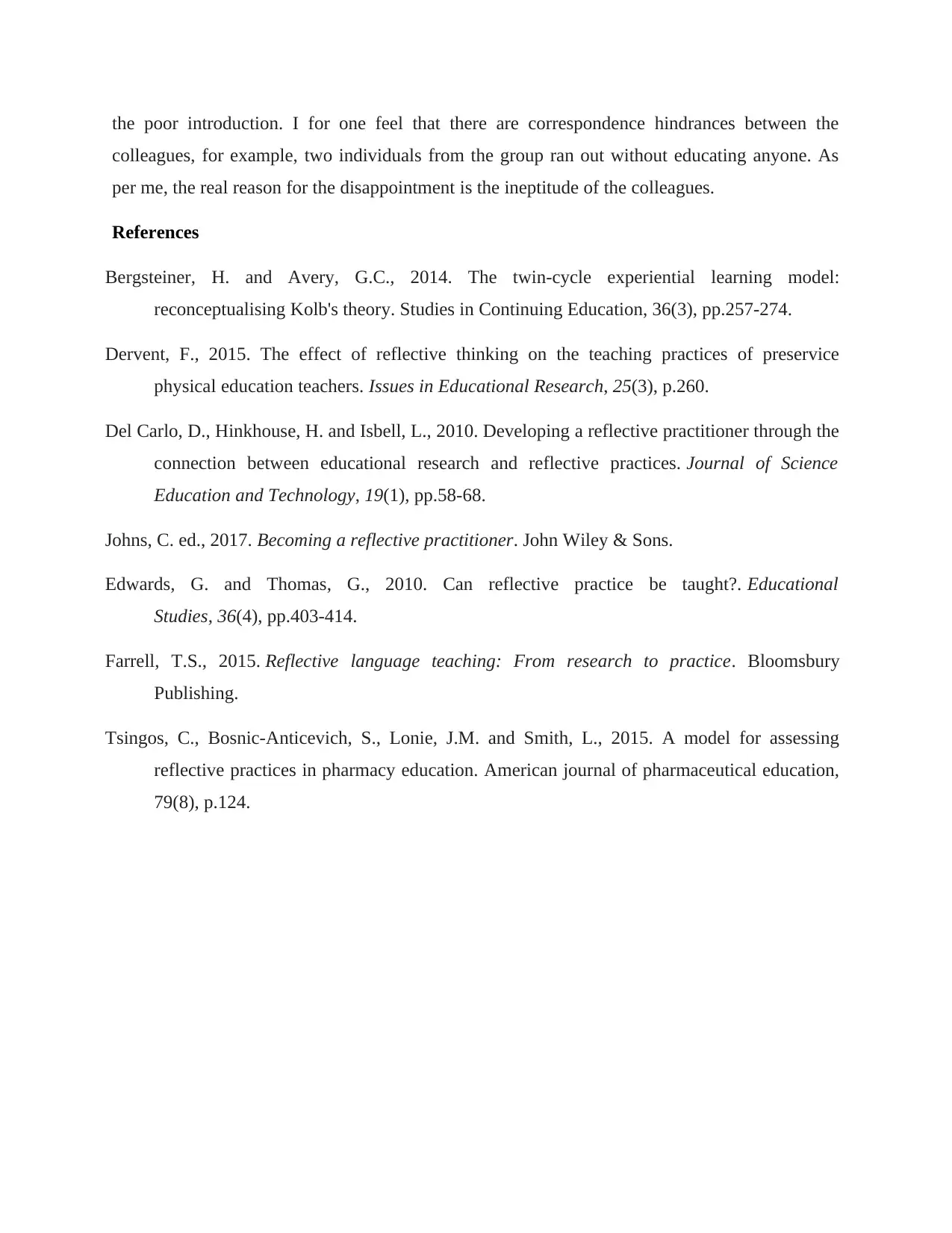
the poor introduction. I for one feel that there are correspondence hindrances between the
colleagues, for example, two individuals from the group ran out without educating anyone. As
per me, the real reason for the disappointment is the ineptitude of the colleagues.
References
Bergsteiner, H. and Avery, G.C., 2014. The twin-cycle experiential learning model:
reconceptualising Kolb's theory. Studies in Continuing Education, 36(3), pp.257-274.
Dervent, F., 2015. The effect of reflective thinking on the teaching practices of preservice
physical education teachers. Issues in Educational Research, 25(3), p.260.
Del Carlo, D., Hinkhouse, H. and Isbell, L., 2010. Developing a reflective practitioner through the
connection between educational research and reflective practices. Journal of Science
Education and Technology, 19(1), pp.58-68.
Johns, C. ed., 2017. Becoming a reflective practitioner. John Wiley & Sons.
Edwards, G. and Thomas, G., 2010. Can reflective practice be taught?. Educational
Studies, 36(4), pp.403-414.
Farrell, T.S., 2015. Reflective language teaching: From research to practice. Bloomsbury
Publishing.
Tsingos, C., Bosnic-Anticevich, S., Lonie, J.M. and Smith, L., 2015. A model for assessing
reflective practices in pharmacy education. American journal of pharmaceutical education,
79(8), p.124.
colleagues, for example, two individuals from the group ran out without educating anyone. As
per me, the real reason for the disappointment is the ineptitude of the colleagues.
References
Bergsteiner, H. and Avery, G.C., 2014. The twin-cycle experiential learning model:
reconceptualising Kolb's theory. Studies in Continuing Education, 36(3), pp.257-274.
Dervent, F., 2015. The effect of reflective thinking on the teaching practices of preservice
physical education teachers. Issues in Educational Research, 25(3), p.260.
Del Carlo, D., Hinkhouse, H. and Isbell, L., 2010. Developing a reflective practitioner through the
connection between educational research and reflective practices. Journal of Science
Education and Technology, 19(1), pp.58-68.
Johns, C. ed., 2017. Becoming a reflective practitioner. John Wiley & Sons.
Edwards, G. and Thomas, G., 2010. Can reflective practice be taught?. Educational
Studies, 36(4), pp.403-414.
Farrell, T.S., 2015. Reflective language teaching: From research to practice. Bloomsbury
Publishing.
Tsingos, C., Bosnic-Anticevich, S., Lonie, J.M. and Smith, L., 2015. A model for assessing
reflective practices in pharmacy education. American journal of pharmaceutical education,
79(8), p.124.
1 out of 7
Related Documents
Your All-in-One AI-Powered Toolkit for Academic Success.
+13062052269
info@desklib.com
Available 24*7 on WhatsApp / Email
![[object Object]](/_next/static/media/star-bottom.7253800d.svg)
Unlock your academic potential
Copyright © 2020–2026 A2Z Services. All Rights Reserved. Developed and managed by ZUCOL.





